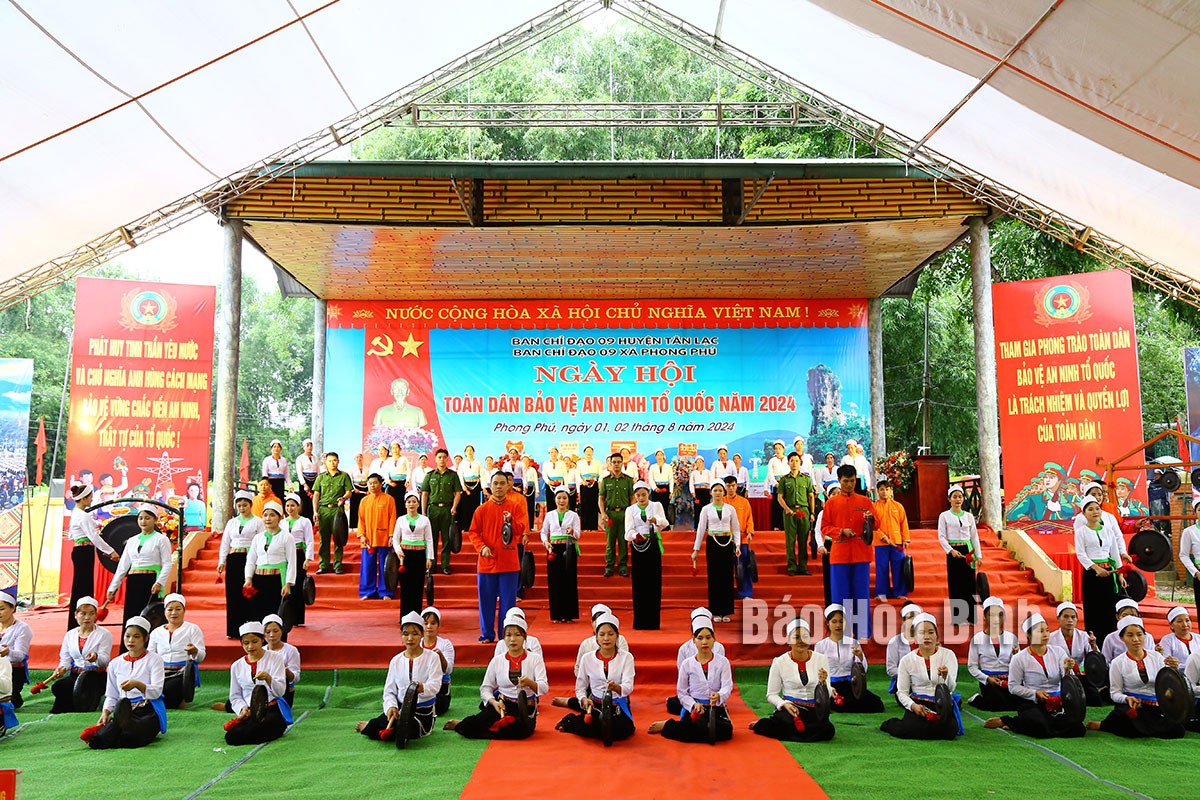
With the attention and investment of the Party and the State, upland communes of Tan Lac district have undergone significant changes. A notable example is Resolution No. 13-NQ/TU of the Standing Board of the province’s Party Committee regarding the implementation of the project "Building upland communes in Tan Lac district into provincial-level tourist areas by 2030, with a vision to 2050."
Departments, functional
agencies, and localities have devised plans to carry out the project and
integrate them into the key tasks of the tourism sector and their localities.
Local residents have gained greater awareness about the benefits of tourism development
and the need to preserve and promote the cultural values of the Muong ethnic
group to create products that serve tourism development. Three upland communes
of Quyet Chien, Van Son, and Ngo Luong have begun to tap into their tourism
potential and strengths with seven homestays in operation. Each year, the three
communes welcome over 15,000 tourists and create jobs for around 250 workers.

Phong Phu commune in Tan Lac district is chosen to host the All
People's Security Safeguard Festival.
Bui Van Tinh, Chairman of Tan
Lac district People's Committee, said that since the beginning of this year,
despite facing difficulties, local authorities have rolled out solutions to
boost economic development and secure social security in the locality.
Currently, agriculture is
still identified as a key driver in local economic development. In the first
half of 2024, the district maintained a cultivation area of 8,300 ha, making up
60.6% of the yearly target. Special attention has been paid to the One Commune
One Product (OCOP) Programme, maintaining and upgrading the ratings of OCOP
items from previous years, and reviewing 3 potential products to submit for
evaluation in 2024. Additionally, the areas under key crops such as sugarcane,
vegetables, and citrus fruits continue to be expanded. The district aims to
have about 500 hectares of pomelo recognised as meeting VietGAP, GlobalGAP and
organic standards, or certified as satisfying food safety regulations by 2025,
along with building a brand for the fruit and forming a pomelo cultivation area
with the application of high technology. Implementing the National Target
Programme on new-style rural area building, Tan Lac currently has 10 communes
meeting 19 criteria and five meeting 11-14 criteria.
The total value of industrial
and small-scale industrial production in the first half of 2024 reached over
703 billion VND (28.5 million USD), equivalent to 50.3% of the yearly plan, up
4.4% year-on-year. The district has 67 cooperatives operating effectively with
total registered capital of 131.86 billion VND. The average income per capita
reached 39.5 million VND last year, and the number of poor households in line
with the 2022-2025 standards declined to 9.4%.
With comprehensive solutions,
decisive leadership, and the solidarity of cadres and people, Tan Lac district
continues to effectively implement the Resolution of the 14th District Party
Congress for the 2020-2025 term, striving to achieve the set targets, improve
the quality of life for local residents, and build it into a prosperous and
beautiful area.
Hoa Binh province is undergoing a dynamic transformation amid Vietnam’s national digital transition. Building on Poliburo’s Resolution No. 57-NQ/TW on breakthroughs in science, technology, innovation, and national digital transformation, the province has rolled out a wide range of practical action plans. A standout initiative is the "Digital Literacy for All” movement, an effort to ensure that no one is left behind in the digital era.
Hoa Binh province is undergoing a dynamic transformation in the wake of the national digital transformation movement. Building on Resolution No. 57-NQ/TW of the Politburo on breakthroughs in science, technology, innovation, and national digital transformation, the province has implemented a wide range of practical action plans. A standout initiative is the "Digital Literacy for All” movement ambitious effort to ensure that no one is left behind in the digital age.
With a spirit of unity and proactive problem-solving, the Party Committee, the government and the people of Dong Lai Commune (Tan Lac District) have made great strides in implementing the resolutions of the 24th Party Congress of the commune for the 2020 - 2025 term. Focusing on leadership and practical actions, the commune has brought the Party’s resolutions into daily life, creating strong impacts and pushing the local development forward.
Amid the nationwide push for digital transformation, young people in Hoa Binh Province are stepping up as dynamic pioneers, applying technology to enhance Youth Union operations and expand the reach of youth-led initiatives. Through creativity and adaptability, Youth Union organizations at all levels have introduced a series of practical solutions, contributing to modern governance and community development.
In recent years, An Nghia commune, located in Lac Son district, has stepped up administrative reform, focusing on improving the quality and efficiency of its single-window service unit for receiving and processing administrative procedures. These improvements have helped create favourable conditions for local residents and organisations to handle administrative procedures, contributing to the commune’s broader socio-economic development.
The Prime Minister-approved master plan to develop the multi-use value of forests ecosystems through 2030, with a vision to 2050, aims to improve the management and sustainable use of forest resources, create jobs, increase incomes, and improve the living standards of ethnic minorities, people in mountainous and remote areas, forest workers and those living near forests.



